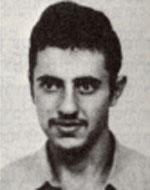Shlomo, son of Rivka and Aryeh (Leonardo), was born on July 22, 1952, in Buenos Aires, Argentina, and immigrated to Israel with his family in 1963. He completed his elementary studies at the Gesher school. After graduating from the Gesher Ashdot School in Kibbutz Ashdot Yaakov, Shlomo was called Sergio Adrian in Argentina, where he lived with his parents in a villa outside the city, where he spent many hours with many friends, Ten years later, he was sent to Ulpan with his family, and when he completed his studies at the Ulpan, the family decided to join Kibbutz Gesher and soon became a member of the kibbutz and settled in kibbutz society, Which was somewhat different from the education of the kibbutz children, Shlomo was more moderate, courteous, always orderly and older than the other members of his group, but these qualities did not keep him away from their company, and he sometimes liked to go wild and do pranks. He was a group organizer for the group’s trips and was never afraid to express his views on various topics, and he became the class’s spokesman at every opportunity. He disagreed with everything about him, criticizing certain phenomena in kibbutz life And succeed in changing them. He did not ignore the life taking place outside the kibbutz framework. He always thought about how to help people, and looked for ways to do unusual things. He was one of the initiators of the “Oded” group, which was sent to help children and families in distress, and enthusiastically enlisted young men and women in the factory. He himself did not join the operation, because he believed that the idea had come to the hands of institutions and organizations, and he was reluctant to do so. He began to work in the orchard industry when he was a child, was very attached to him and learned all his problems. He was not averse to any work and worked out of interest and responsibility, and out of a great desire to achieve achievements. His desire to achieve perfection in everything he did guided him in his approach to work. He followed all the innovations in the industry and acquired great knowledge. He had the joy of creating and loving work for his own sake, and even in leisure he found time to deal with electronics, and built various devices, such as an electric xylophone and a sound amplifier. He was the technician at the kibbutz radio station, and he always found an interest in doing something, building something new or fixing something old. Mostly he liked to do for the sake of his family, who was most attached to her. He spent most of his spare time with the family, and from his childhood he took care of his brother. When he was on the kibbutz, and later in the army, he continued to maintain close contact with all his family. He loved to photograph his family, and a lot of photo shoots and various landscape events. He developed his pictures himself, and devoted himself to this hobby for many hours. In addition to all his hobbies, Shlomo loved music of all kinds, and he loved to dance to the music. He was considered a great dancer, and in his dance he expressed his joy of life. Shlomo loved all the Yaffa things in life, and tried to take advantage of every moment of action. It was open and free, and it was easy to contact him. His circle of friends was very broad, and everyone was willing to devote time, thought and all possible help. Shlomo was drafted into the IDF at the beginning of November 1971, when he was about twenty years old, and was assigned to serve in the infantry, and after completing basic training courses for infantry commanders and a course for mortars, And to strive to advance. So he chose to go to a combat unit and to a unit where the service was voluntary. At the same time, he saw no future in the army and waited for the day he would return to the agriculture and be able to study and learnIn the world. But as long as he served in the army he fulfilled his responsibility. Shlomo was not prepared to accept the phenomena of injustice or wrongdoing. Therefore, his soldiers saw him as a reliable commander and in his words, who understood them and represented their problems. His soldiers trusted him and were Simcha to go out with him on missions. There were many who preferred to serve under his command and not under the command of another noncom, and he always made sure that his soldiers understood and knew, at least as he did, what was before them. Against the Syrians on the Golan Heights In a battle that took place on Mt. Hermon on the 22nd of Tishrei 5734 (22.10.1973), Shlomo was injured during the occupation of a position and was killed in a cemetery in his home on Kibbutz Gesher. Kibbutz Gesher published a pamphlet in his memory, in which friends and acquaintances describe his character, his way of life and his activities.
